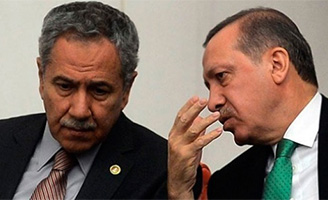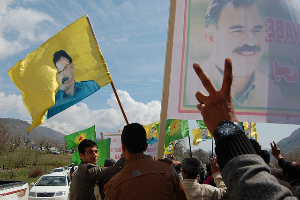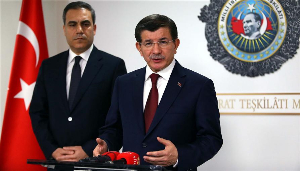Battles and Wars: Bracing for Erdoğan’s Long Goodbye
By Gareth Jenkins (vol. 8, no. 6 of the Turkey Analyst)
On March 20, 2015, Turkish President Recep Tayyip Erdoğan publicly criticized the announcement by the ruling Justice and Development Party (AKP) that it was planning to establish a monitoring committee to oversee discussions about reforms on the Kurdish issue. On March 21, 2015, Government Spokesperson Bülent Arınç bluntly told Erdoğan not to interfere in the running of the government. Arınç repeated his admonition the following day. It was the first time that a leading member of the AKP had issued such an outspoken public challenge to Erdoğan’s authority.

What the Columnists Say
Abdülkadir Selvi in Yeni Şafak asks what’s happening to the AKP, and warns that the spell of the party as the symbol of stability is being broken. Orhan Bursalı in Cumhuriyet writes that the exposure of an internal power struggle no doubt creates certain question marks in the minds of voters, but that the impact on voter behavior is marginal. What matters more, he writes, are the mounting economic problems and the impression that the government is surrendering to PKK. Kadri Gürsel in Milliyet writes that AKP will lose either Kurdish voters or Turkish nationalists in the upcoming elections, depending on whether it is Erdoğan or the government that sets the course, and that regardless, Erdoğan’s dreams of presidential rule is going to be the casualty. Oya Baydar on the t24 news site draws attention to a belligerent ultimatum that was issued by the General Staff in response to the Newroz message of PKK leader Abdullah Öcalan. Baydar warns that military tutelage is making a comeback.

What are Erdoğan’s Real Intentions in the Kurdish “Solution Process?”
By Burak Bilgehan Özpek (vol. 8, no. 5 of the Turkey Analyst)
President Recep Tayyip Erdoğan’s bid to concentrate all power to himself has increased the skepticism and reluctance among the representatives of the Kurdish political movement and among liberals. The suspicion is widespread in Turkey that the “solution process” of the Kurdish problem is going to pave the way for a fully authoritarian government. What many fear is that Erdoğan is using the solution process and the promise of Kurdish peace as instruments in his bid to consolidate his position as the unchecked leader of the country.

The Kurdish Nationalist Movement and the Dialogue with Öcalan
By Gareth Jenkins (vol. 7, no. 22 of the Turkey Analyst)
On November 29, 2014, Abdullah Öcalan, the imprisoned founder of the Kurdistan Workers’ Party (PKK) told a visiting delegation from the pro-Kurdish Peoples’ Democratic Party (HDP) that the Kurdish issue could be resolved – and the PKK’s 30 year-old insurgency ended – within four to five months provided that the ruling Justice and Development Party (AKP) took the appropriate measures. In reality, not only is there little prospect of breakthrough but frustration at the lack of progress has begun to highlight the struggle for relevance between different elements within the Kurdish nationalist movement.

The AKP Uses the “Solution Process” to Suspend the Freedom of Expression
By Burak Bilgehan Özpek (vol. 7, no. 21 of the Turkey Analyst)
The strategies of the Turkish state to deal with the Kurdish question has undergone a dramatic change since the 1990s, but what has remained constant is the state’s stance toward freedom of expression. The ruling party of Turkey has repeatedly demonstrated that it uses lofty goals like democratization to severely restrict the freedom of expression and to suspend the rule of law. “Peace” is another such goal. The AKP’s strategy in the “solution process” with the Kurdish movement rests on keeping the process secret, and stigmatizing and intimidating those who raise questions. The AKP’s strategy indicates that “peace” can be just as viable as a strategy to secure and defend authoritarian power as armed conflict.








